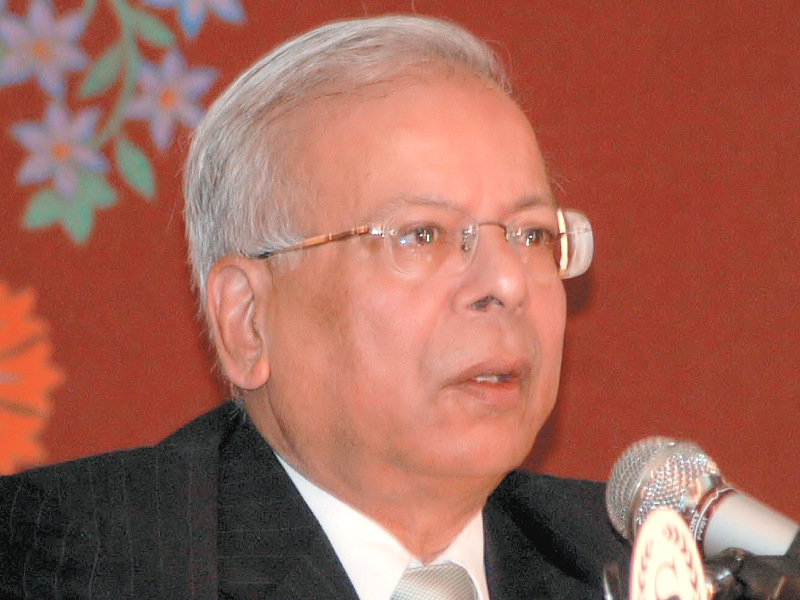
Ishrat Husain’s nomination for interim prime minister is confirmation of an expectation among many of Pakistan’s economic policy cognoscenti: that the inevitable negotiations with the International Monetary Fund for yet another bailout will take place under the interim administration.
The IMF is royally annoyed at the fact that Pakistan effectively took as much money from the last bailout as possible and then bolted before implementing any of the structural reforms that it promised. So this time, the IMF is insisting not just that the reforms take place before it hands over any cash, it is also insisting that the government seek broad political consensus for those reforms.
The job of the interim prime minister, therefore, is to have enough credibility to negotiate a reasonable bailout package with the IMF, construct a budget loaded with unpopular cutbacks that comply with the IMF’s conditions, and then hand over the Money Bill like a ticking time bomb to the new Parliament which will have no option but to pass it, since it will take office so close to the June 30 deadline for approving a budget.
This is where Ishrat Husain – currently the dean of the Institute of Business Administration in Karachi – comes in, with an array of skills and a résumé that seems almost tailor-made for the job at hand.
He started his career in 1964 in the civil service of Pakistan so he has a fair grasp of how the bureaucracy works. He has worked at the World Bank for two decades between 1979 and 1999 and so is well-versed in the language of Washington-based international lenders. He has a PhD in economics from Boston University, which lends him intellectual credibility. And his tenure as governor of the State Bank of Pakistan from 1999 to 2006 is remembered as an era of monetary stability and low interest rates, earning him the business community’s trust.
His one apparent flaw is that he is not a politician. Yet in this scenario, that works out as an asset. He will not arouse any insecurities among the politicians currently vying for the job: they know that Husain poses no political threat to them. (Abdul Hafeez Shaikh also has many of the same qualities, but unfortunately is tainted by his stint at the helm of the finance ministry for much of the current administration’s term.)
The only question remains as to whether or not Parliament will implement the reforms that the IMF demands. There are three reasons to hope that they will in fact undertake the tough, but necessary policy changes that the IMF will insist upon.
Firstly, Ishrat Husain is respected across the political spectrum so few will doubt that he negotiated the best deal possible for Pakistan. Second, the IMF will not actually hand over any cash until the reforms are implemented (and by early 2014, the government will be desperate for that cash). But finally, and most importantly, the incoming government will have adequate political cover to blame the unpopular measures on the previous government or Husain himself but secretly be glad to be able to do what is necessary to get the nation’s economy back on track.
If Husain is in fact appointed the interim prime minister, here is what will happen next: he will initially be hailed as a wise choice. (Expect the stock market to go through the roof.) Then he will engage in talks with the IMF, and hand over the deal that all serious policy analysts already know is coming. At that point, politicians and the media will erupt in universal condemnation of Husain’s efforts, accusing him of selling the national interest down the river. But he will have done what is required of him.
Published in The Express Tribune, March 16th, 2013.
COMMENTS (27)
Comments are moderated and generally will be posted if they are on-topic and not abusive.
For more information, please see our Comments FAQ


1732519298-0/BeFunky-collage-(85)1732519298-0-165x106.webp)
1732611352-0/lamar-(5)1732611352-0-165x106.webp)
1732610018-0/BeFunky-collage-(91)1732610018-0-165x106.webp)
1732603037-0/BeFunk_§_]__-(51)1732603037-0.jpg)
1732610854-0/Untitled-design-(68)1732610854-0-270x192.webp)
1732608486-0/BeFunk_§_]__-(54)1732608486-0.jpg)
1732604291-0/BeFunk_§_]__-(52)1732604291-0.jpg)

1732606500-0/BeFunk_§_]__-(53)1732606500-0.jpg)






My complete support with Mr. IH , Excellent choice, and desperate need of the hour,
It will be suicide for Pakistan to go to the IMF. The country does not need this, what it needs is trade with Iran on barter to get the oil and natural gas.
With energy the country will grow, but not with borrowing money to pay the saudis for oil
@Saleen: "@Umair Not to forget he is from Karachi (MQM factor)" . What a profound statement!
It will be a suicide to give IMF and their mouth pieces absolute rule over via PM house, but since 2015 Balkanization of Pakistan date is approaching soon I don't see why not. It will be hassle to changeID cards and passports but best of luck anyways.
It's odd that Pakistan's economic plans read like something from a country that hasn't basically said "bring on the sanctions."
Dr. Ishrat is pure love. Ishoo sahab, just promise to come back to us when you're done, pls?
@Haider Hussain: I agree! Last time the IMF made an agreement with an elected PPP government and still the promises made to it were not kept. What chance is there that promises made by an interim govt. are going to be honoured?
Those responsible for bringing the country to this stage in the last 5 years must first be punished or else the politicians (looters & plunderers) will do this again.
I know youre doing a terrific job as IBA dean please dr sahab dont take this offer as its a thankless job that for mere 2 months and we want you to work for IBA as youre doing a fantastic job as its dean creating its international stature. Youre a hardworking man who deserves to be IBA Dean as youre creating an international stature university in a metropolitan city of Karachi. i pray you remain with IBA for min. of 10 more years inshaallah!
I hope he remains for two years the least as PM to cleanse this country from all the wrongs which this DEMOCRACY has given us otherwise just to be there for a mere 2 mths opportunity he should not waste his time. He is already doing a terrific job as IBA Dean and Director trying to make it of international stature. I pray he stays at IBA for a min. of a decade
Former state bank of pakistan governor for an interim prime minister is a excellent choice.
He is honest and very patriotic person.
Dr. Ishrat is a great intellectual mind with his own economic reforms and ideas. Being his student I know that he is absolutely unbiased and can give Pakistan atleast an economic direction which she needs desparately.
IMF would be an idiot to negotiate the SBA with the interim setup. I don't think it's gonna happen until the next government assumes office
@Umair Not to forget he is from Karachi (MQM factor)
@TruthNFacts: what sovereignty and what interference! Who violates and who interfere! what difference ur country can make rather than to deprived his own children from quality education, health and clean drinking water just for the sake of making useless bombs and arsenal and to fed a parasite like Army of 600000. Real sovereignty is to provide ur ppl good education, clean housing facilty, health and a respectable livelihood. Just study IMF conditions and then decide who is friend and who is the enemy of ur country.
@Shahzad: Musharaf :D
@Azeem: On the contrary in face of challenges lies opportunity. And yes we do deserve the best after five years with fools.
We dont need any more loan from IMF. WHo will repay these loans?
Dr. Ishrat Hussain is a good man. A great man who has achieved much in his career. His role as Governor State bank of Pakistan was revolutionary and he changed the institution tremendously. His refoms have as yet not been undone despite obvious efforts to do so. He truly played a role in introducing Pakistan's banking sector to the modern age. After leaving the SBP Dr Ishrat Hussain became Dean ad Director of the Institute of Business Administration at The Institute fo Business Administration (IBA) and there too his honesty and dedication has enabled IBA to take news steps and move forward. The Institution was stagnating before he took over and I am a partial witness to those times.
Dr Ishrat Hussain enjoys a brilliant reputation and is respected by all and sundry. And that stature is precisely why i do not wish for him to become PM for I know quite well that the caretaker PM will have to take many steps including negotiating with the IMF, pretty much creating the next budget and conduct the upcoming general Elections and he shall be criticized by many in various quarters despite his sincere efforts to do whats best. i do not wish to see a great man be tainted in the twilight of his life like we are presently witnessing in the case of Justice (R) Fakhruddin Ebrahim.
Please Dr Sahib even if you are offered the job kindly decline. We the people of Pakistan do not deserve someone like you.
At that point, politicians and the media will erupt in universal condemnation of Husain’s efforts, accusing him of selling the national interest down the river. But he will have done what is required of him Shows how our media and politicians make a good person look bad..... He is a wise and a nice guy for the post.... People won't mind having him as a caretaker for 2 years!
Excellent choice for an interim prime minister. However, is he a "dual national?" What good did the PPP do if a loan is taken from the IMF? Nothing except leaving the country in abject penury. Domestic and foreign loans have become a 'lifeline' and the people want a breather and a reign of simple and humble technocrats. We require 'maturity' in governance and not a 'wheeling and dealing' government that receives deafening accolades from psychopaths. Salams
Another establishment
Very well written. Agreed cent percent.
A very good analysis of Dr.Ishrat's nomination in the above article. In fact, nomination of Dr.Ishrat clearly indicates the interference of The US backed financial institutions in Pakistan, which is no secret. It also reveals the level of Pakistan's sovereignty.
Mr. Ishrat Hussain is the best choice of all nominations. I don't know what on earth goes through N league's mind when they oppose him.